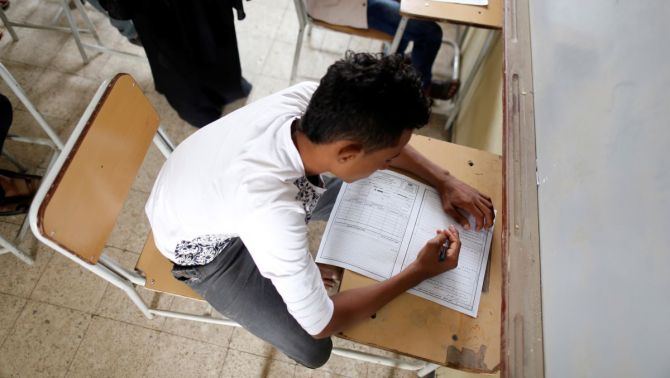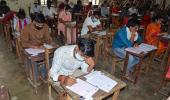Upholding the University Grants Commission guidelines, the Supreme Court on Friday held that no state and university can promote students in the final year/terminal semester without holding the examination, observing performance in such exams are a 'reflection of competence' of the students.

Photograph used for representational purposes only/Reuters
The court also ruled that the directives by the UGC to universities and colleges to hold final year exams by September 30 was well within its domain.
A bench of Justices Ashok Bhushan, R S Reddy and M R Shah said if any State/Union Territory in exercise of their jurisdiction under the Disaster Management Act (DMA) has taken a decision that it is not possible to conduct the final year/terminal semester examination by September 30, then they can make an application to the UGC for extending the deadline.
The application shall be considered by the UGC and the rescheduled date be communicated to such State/Union Territory at the earliest, it said.
It held that the State Governments or State Disaster Management Authority (SDMA) in exercise of powers under the Disaster Management Act (DMA), 2005 has no jurisdiction to take a decision that the students of final year/terminal students should be promoted on the basis of earlier year assessment and internal assessment.
'The decision of the State/State Disaster Management Authority (SDMA) to promote the students in the final year/terminal semester on the basis of previous performance and internal assessment being beyond the jurisdiction of Disaster Management Act, 2005 has to give way to the guidelines of UGC dated July 6, directing to hold examination of final year/terminal semester,' the bench said in its 160-page verdict.
'The State and University cannot promote the students in the final year/terminal semester without holding final year/terminal examination'.
'We do not find any unreasonableness or arbitrariness in the revised guidelines of University Grants Commission dated July 6, 2020 which require all Universities/ Colleges to conduct at least the final year/terminal semester examinations,' the bench said, adding, these guidelines 'are not beyond the domain of the UGC and they relate to coordination and determination of standards in institutions of higher education'.
The court while disposing of a batch of petitions filed by students, private organisations and Shiv Sena's youth wing 'Yuva Sena' framed seven issues and said the July 6 guidelines of the UGC cannot be ignored by terming it as non-statutory or advisory in nature.
The petitioners claimed that several states like Maharashtra, Punjab, Rajasthan and Madhya Pradesh have decided to cancel the examinations and promote the students on the basis of their previous performance.
Union Minister of Education Ramesh Pokhriyal 'Nishank' welcomed the verdict and said politics should be kept away from the sphere of education.
'I heartily welcome the decision taken by the Supreme Court with respect to the final year exams. Let's keep politics away from education and educate our politics,' Nishank tweeted.
Jawaharlal Nehru University (JNU) vice-chancellor Mamidala Jagadesh Kumar also welcomed the judgment.
Maharashtra Higher and Technical Education Minister Uday Samant said the state government respected the verdict and that discussions will be held with vice chancellors for holding the final year examinations.
The government was thinking of 'decentralising' exam venues to tehsil-level, he told reporters in Mumbai.
Asked if the Maharashtra government would file a review petition, Samant said, "It is under consideration."
"The state government will announce fresh dates of exams after the talks. We will give students ample time between the announcement and the date of examination," he said.
Samant also said the health of students remains a top priority in view of the COVID-19 pandemic
West Bengal Chief Minister Mamata Banerjee said her government was weighing the pros and cons of holding final-year college and university exams before Durga Puja in October.
"I have told our education minister to look into the possibility of conducting the final-year exams in universities and colleges before Durga Puja in October. The options of both online and offline exams should be looked into.
"We are not against any exam; we are just saying that a pandemic is on, and it could put lives of students at risk," Banerjee said while addressing a virtual rally of Trinamool Congress Chhatra Parishad (TMCP), the students wing of the ruling party.
In its verdict, the top court said the final year/terminal semester examination of under-graduate or post-graduate is an opportunity for a student to show his or her optimum calibre which paves a future career both in academics and employment.
'The Final year/terminal semesters examinations are important because the learning process is a dynamic interaction where the only way to figure out what students know is to seek evidence of their knowledge and to evaluate it. Performances in examination especially Final year/terminal semester examination are reflection of competence of the students.'
The bench said the differentiation made in the revised UGC guidelines of July 6 to hold final or terminal semester examination and to give option for earlier years/ intermediate semester for not holding the examination has a rational basis.
'The differentiation has nexus with the object to be achieved. We, thus, reject the challenge to the revised Guidelines on the ground that there is any discrimination between the students of final year/terminal semester and those of intermediate and first year.'
The bench, which dealt with the challenges to the UGC guidelines of July 3, 2020 elaborately, said the terminal semester/final year examination also provides an opportunity to the students to improve upon their overall score/marks which are very crucial for academic excellence and opportunities of employment.
It also said the July 6 Guidelines are in continuation of the April 6 Guidelines and are not contrary to the earlier communication.
Dealing with the question of several states like Maharashtra and Delhi having cancelled the final year exams while exercising powers under the DMA, the bench said the law empowers the State Disaster Management Authority (SDMA) as well as the state government to take measures for prevention and mitigation of a disaster and the action have been given overriding effect to achieve the purpose and object of the Act.
'Saving of human life has been given paramount importance under the Act, 2005. Primacy has been given to the actions and measures taken under the Act, 2005 over anything inconsistent in any other law for the time being in force.'
It said the July 6 guidelines insofar as it directs the Universities and Colleges to complete the final year/terminal year examination by September 30 shall be overridden by any contrary decision taken by the SDMA or the state government exercising power under the DMA.
The top court said when the SDMA and state government take a decision that for mitigation or prevention of disaster it is not possible to hold physical examination in the State, the said decision was within the four corners of the DMA.
The bench noted that the revised guidelines and the standard operating procedure for conduct of examinations dated July 8 clearly showed deep concern with the health of all stakeholders--that is students as well as the exam functionaries, and hence 'challenge to the Guidelines on the ground of it being violative of Article 21 is repelled'.












 © 2025
© 2025